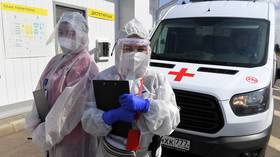Moscow hospitals to deny routine treatment to patients who refuse Covid-19 vaccines, as Kremlin warns skepticism is costing lives

People waiting for planned operations and other non-urgent medical treatment in Moscow will be denied care in the Russian capital’s hospitals if they have not been vaccinated against Covid-19, but are eligible to receive a jab.
The rule change, designed to protect patients, came from the city's Department of Health on Friday. Under the new measures, only those with certificates proving they have been immunized will be admitted onto wards for most types of treatment and procedures.
Emergency care, along with anti-cancer therapy and support for those with blood diseases, “will be provided, without exception, to every resident of the city, regardless of their vaccination status,” the city administration confirmed.
“A person who is in a hospital because of an injury or illness, by definition, has a weakened immune system. For such patients, coronavirus disease is especially dangerous,” officials said in a statement. “Every day, patients are transferred from Moscow clinics to Covid hospitals. If a week ago there were 130 such cases per day, then yesterday it was already almost 200.”
Also on rt.com Moscow mayor warns of possible ‘limited but HARSH’ Covid-19 lockdown, citing worsening health situation in Europe's largest cityEarlier this week, Moscow became the first city in the world to make vaccination a requirement for employees in many public-facing industries. The order applied to a number of sectors, including people working in hospitality, transport and entertainment venues.
Businesses working in these sectors will be required to ensure no more than 40% of their staff are unvaccinated, with hefty fines for organizations falling foul of the measures.
In a statement issued at the time, the mayor of the Russian capital, Sergey Sobyanin, said that there had been a “dramatic” worsening of the situation. “Ultimately, it’s up to everyone to get vaccinated or not,” he said. “You can protect yourself or hope that everything will work out... This is a personal matter... as long as you sit at home or in the country.”
“But when you go out into public places and come into contact with other people, willingly or unwillingly, you become an accomplice of the epidemiological process. This is the chain link for the spread of a dangerous virus,” the mayor said.
Earlier on Friday, officials confirmed that companies can suspend employees who refuse to be vaccinated without pay, in order to meet their quotas.
Vaccine skepticism has been blamed for the slow uptake of the jab in Russia, where the immunization program is falling behind a number of other European nations. Only around 10% of Russians have had both doses of a jab, despite supplies being made widely available.
Speaking to journalists on Friday, Kremlin spokesman Dmitry Peskov said that it was “stupidity” to claim the handling of the pandemic had been botched, but bemoaned “total nihilism” driving the low rates of vaccination.
Moscow saw its numbers of confirmed cases hit an all-time high in the last 24 hours, with 9,056 positive tests recorded on Thursday. Curfew measures have been introduced, banning the city’s nightlife establishments from staying open past 11pm.
“We are very close to much more severe – temporary, but severe – decisions on restrictions,” Sobyanin added.
Like this story? Share it with a friend!













